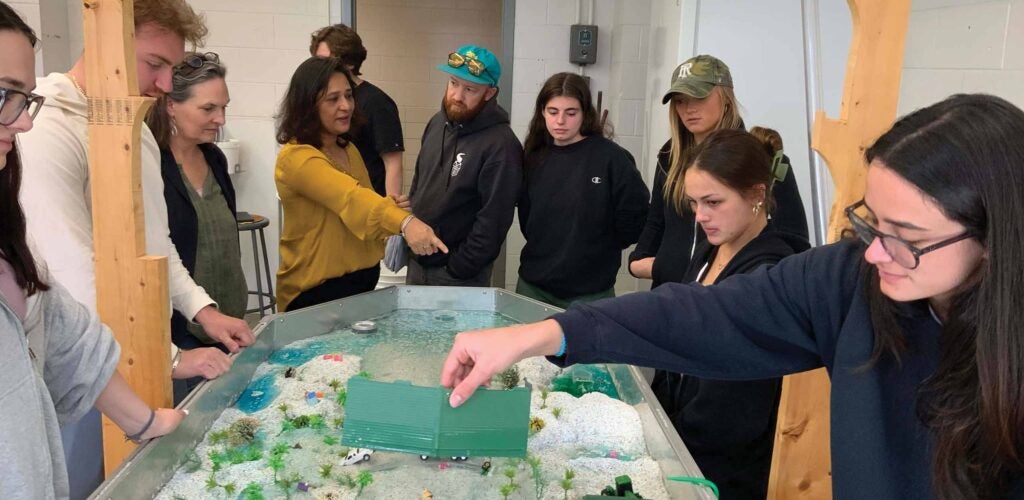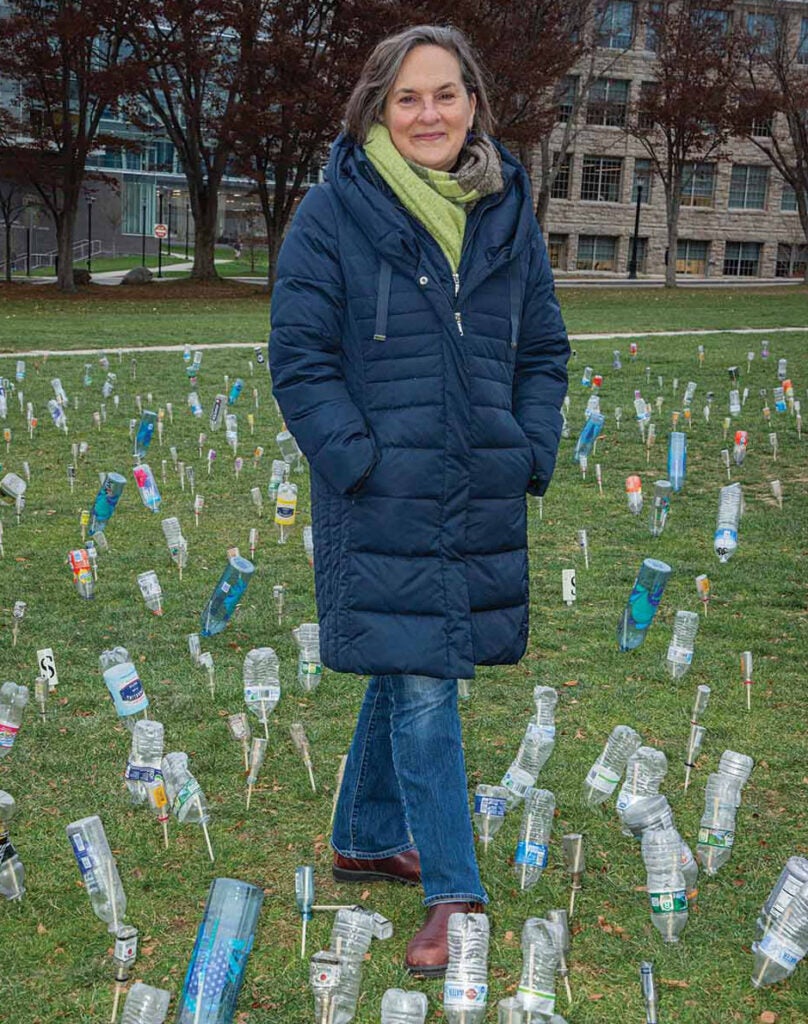
Students in the honors course River Stories visited URI geoscientist Soni Pradhanang’s river simulation table.
Professor Heather Johnson’s students examine rivers through history, culture, literature, and ecology. And they gain firsthand knowledge of rivers by going straight to the source.
Students in Heather Johnson’s honors class, River Stories (HPR 412), learn about rivers not only from books, but by paddling them in kayaks and taking riverboat tours. They walk along riverbanks and learn from conservationists, scientists, and others.
Lessons From the Field
Field experiences are essential. “We need to be on the river, to feel its tidal pulls and touch the cold water, so that we are not learning about the idea of a river but about a tangible life force,” Johnson says. “One of the best moments last semester was on a kayak trip to the Pettaquamscutt River (also known as Narrow River). The sun was setting, and everyone grew quiet. Being on the river fosters that kind of connection.”
Johnson takes her students to Rhode Island sites to experience physical and visceral connections to rivers, but the course also provides national and global perspectives. Students also learn from guest teachers like Lorén Spears ’89, Hon. ’17, director of the Tomaquag Museum in Exeter, R.I.
“In documentaries about U.S. rivers, students learn about the impacts of 20th-century power projects,” says Johnson. “And on guided walks with Lorén Spears, they learn about the significance of rivers for the Wampanoag and Narragansett, from pre-colonization to the present day. Her stories of respecting all life in rivers contrasts with industrial-age narratives of ‘improvement’ with their casual disregard for the cultural histories and environmental well-being of rivers.”
Rivers Hold Memories
“The idea that rivers have memory guides this course,” Johnson says. “We read a piece (“Mississippi Drift,” see the self-study guide, right) about the Mississippi River and the tension between romant-icizing rivers and seeking to know the reality, which is not always a pastoral, pretty scene.
“Toni Morrison wrote about the memories held in rivers, and we see this in stories of towns flooded by dam projects across the U.S.,” Johnson says. “I visited just such a man-made lake in California this past summer: A power company diverted a river to flood the land, displacing the Maidu inhabitants. The lake today may, at first glance, seem appealing as a place for recreational boating, but its depths tell a story of loss and injustice.”
Active Learning
“In this class,” says Johnson, “I don’t lecture. We walk, kayak, read, and discuss.”
Students in Johnson’s fall 2023 class even became activists, placing more than 3,000 plastic bottles on the Kingston Campus Quad to call attention to the impact of plastics on rivers as part of a petition drive to support a Rhode Island bottle bill. The students collected more than 500 signatures.

Professor Heather Johnson on the Quad among a display of plastic bottles placed by students in her River Stories course. They collected signatures for a Rhode Island bottle bill; the bottles helped draw attention to the issue.
“In this class, I don’t lecture. We walk, kayak, read, and discuss.”Professor Heather Johnson
The Takeaway
“This course helped me improve my creative writing,” says Livi Donatelli ’23, a neuroscience and psychology major. “I never had a class that had such interesting excursions. We kayaked and walked the Wood and Saugatucket rivers.”
English major Jack Wholey ’23 says, “The class was imaginative and tied together effectively. On the first day of class, Professor Johnson said, ‘When you drive over a bridge spanning a river, don’t just notice the glint of light reflected off the water. Take time to learn about the river’s culture, its history, the culture of the people who have lived along its banks, its ecology, and stories.’”
—Dave Lavallee ’79, M.P.A. ’87
Photos: Nora Lewis
Rivers: A Self-Study Guide
Read
Dart, by Alice Oswald
“I love this book of poetry,” says Johnson. “It is devoted to a single river in England and captures all of the voices, human and nonhuman, that make up the riverscape.”“Mississippi Drift: River vagrants in the age of Wal-Mart,”
by Matthew Power, Harper’s Magazine, March 2008.
harpers.org/archive/2008/03/mississippi-drift
Watch
DamNation: The Problem with Hydropower, by Patagonia Films explores the history of dams in the U.S. Watch at youtube.com/@patagonia
Go
“Visit your local rivers and spend time slow-looking,” Johnson says. “Many New England towns have a ‘friends of’ the rivers association, and that’s a great way to get involved in river stewardship.” In Rhode Island, the Rhode Island Rivers Council, ririvers.org, is the umbrella organization for the state’s 11 river councils.
Participate in a river cleanup.

This looks like an amazing class.
Wow, this is AMAZING! I would love to be a part of it in some way.